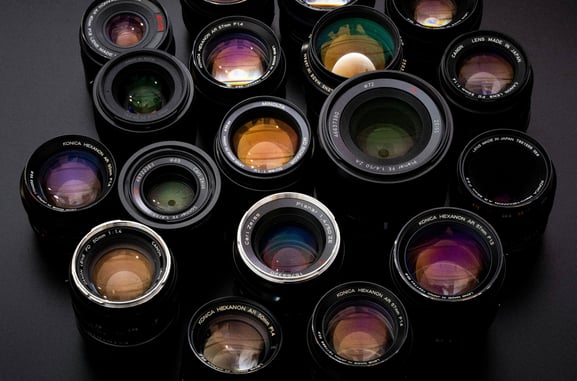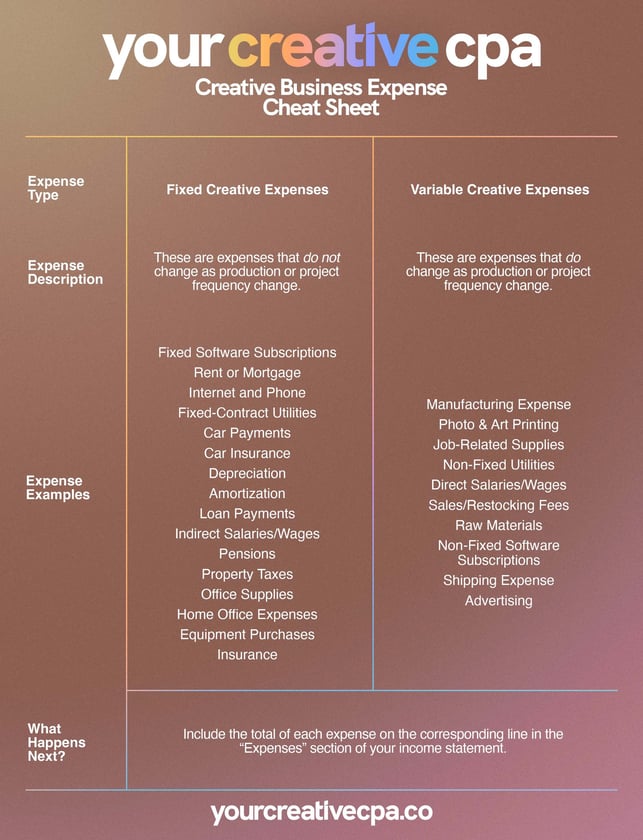
Latest Article: Bitcoin Isn't as Decentralized as You Think. Here's Why.
2024 Guide to Deducting Expenses For Your Creative Business
Maximize deductions and save money - learn what business expenses you can deduct, how to lower your business taxes, and the small business tax deductions you need to know about.
ACCOUNTINGJUMPSTARTTAXTAX 101
David Kindness, CPA
4/10/2024



2024 Guide to Deducting Expenses for Your Creative Business
Updated on April 9, 2024
Written by David Kindness, CPA
Why you can trust Your Creative CPA
Our content is written, edited, or both by industry experts who are creative entrepreneurs just like you. Learn more.
Running a creative business is an incredible experience, but managing your finances can be challenging. For many of us, we're not just the creative mastermind, we're also the marketer, web designer, accountant, janitor, customer service rep, and more. Balancing so many roles can be frustrating and stressful.
Have you ever spent hours creating amazing things for your online business, but then tax time rolls around and you're confused about what you can deduct? You're not alone - expenses and tax deductions can be really confusing. But fear not, because the YCCPA Creative Business Expense guide is here to help you understand Creative Business Deductions and keep more of your hard-earned money. Read on to learn more.
Fast Facts about Creative Business Expenses
There are three main types of business expenses: fixed, variable, and unusual.
Maximizing creative expenses means higher tax deductions, which lowers your taxable income, saving you money on taxes!
Keep good records of your business expenses – receipts, invoices, and mileage logs are key!
Types of Small Business Expenses
There are three main types of business expenses to keep track of:
Fixed Expenses: These stay the same each month, like rent for your studio or website hosting fees. Think of them like the steady beat in a song – they're always there.
Variable Expenses: These change based on your projects, like buying new paint for a portrait or running online ads for your latest design. These expenses are like the melody in a song – they change with your creative flow.
Unusual Expenses: These happen occasionally, like attending a big design conference or buying a new top-of-the-line computer. Think of them like a surprising drum solo in a song – they don't happen all the time, but they can be a big deal.
Understanding these categories will help you sort your Creative Business Expenses throughout the year. Here is a helpful YCCPA cheat sheet describing the most common types of fixed and variable creative business expenses:


CLICK HERE to download this FREE cheat sheet, so you can reference it anytime, anywhere.
Business Expenses vs. Personal Expenses
You might think that because your business is such a big part of your life, all your expenses must be the same. But it's important to separate your business expenses from your personal ones, because business expenses are tax-deductible, and personal expenses are not tax-deductible.
This is, of course, because of the IRS: they allow you to deduct business expenses that are both reasonable and necessary. "Reasonable" means it's typical for your kind of business, and "necessary" means it helps you run your business. Basically, if you can link an expense to running your business, then you can include it on your income statement and deduct it on your tax return.
What is a Tax Deduction in a Creative Business?
Imagine tax deductions like magic money-saving tools, because by claiming them, you can lower your taxable income and the taxes you owe. You may even be able to turn a tax payment into a tax refund! Tax deductions generally result from your regular business expenses, like rent, internet, creative supplies and equipment, subscriptions, utilities, and more. These expenses should be included under the "expense" section on your income statement.
The more expenses your business has, the more tax deductions you can take, and the lower your taxable income and tax payment will be. Keep in mind that tax deductions are different from tax credits, which reduce the amount of tax you owe dollar-for-dollar, and which you must qualify for.
Common Expenses in Creative Businesses
Now that you know what business expenses and tax deductions are and the basics of how they work, let's take a look at several common expenses that you might encounter in your creative business:
Home Office: If you dedicate a space in your home for your creative work, you can deduct a portion of your rent, utilities, and internet.
Office Supplies: Office supplies include the items you need to help bring your creative vision to life, from paints and brushes, to printer ink and paper, to paper clips and rubber bands.
Software Subscriptions: If you use design software, editing tools, project management platforms, or other software subscriptions, then be sure to include these expenses on your Income statement.
Marketing and Advertising: these are expenses incurred for promoting your creative work online, in print, or on TV.
Education and Training: Investing in yourself by taking workshops or online courses to hone your creative skills is a deductible expense.
Equipment and Tools: This includes cameras and lenses, musical instruments, computers and monitors, sound boards or mixers, or any other specialized equipment you need to create your art. There might be limitations on how much you can deduct in one year, so check with a tax professional if you're unsure of how to proceed.
Travel Expenses: Traveling for business purposes, like flying to another location for a photo or video shoot, attending industry events, or even just driving 30 minutes down the road to meet a client, can all be deducted. Ensure you keep good records of your travel expenses in case the IRS requests verification.
Website and Domain Fees: Having a professional website is crucial for many creative businesses, and website hosting fees, domain name registration, and other similar fees can all be deducted.
Business Phone and Internet: The phone and internet you use specifically for your business can be deducted. Similarly to the home office deduction (mentioned above), if you use a portion of your home internet and phone for business purposes, you can deduct that portion on your income statement and tax return.
Expense Tracking Software
Keeping good income and expense records will make preparing both your income statement and tax return a breeze. There are many expense-tracking options, such as Google Sheets, Excel, accounting software programs, and expense-tracking apps, all of which can help you stay organized.
Many accounting and expense-tracking software options can store receipts digitally, categorize your expenses, and even generate financial reports. Some of the most popular software options include:
QuickBooks: a robust, capable, all-purpose accounting and expense tracking software for businesses of all sizes. Additionally, Quickbooks integrates with Turbotax, making tax prep a breeze.
Xero: A capable, cloud-based accounting software designed for small- to medium-sized businesses.
HoneyBook: HoneyBook is a client and project management platform combined with expense tracking and invoice creation, making it an ideal software for businesses of nearly any size.
Remember, it's also important to keep physical copies of receipts, invoices, and mileage logs for larger purchases or in case of an audit.
Conclusion
Navigating creative business deductions can be overwhelming, but mastering the concepts and strategies discussed above is key to mastering your creative business's finances. By understanding Creative Business Deductions and keeping good records, you can keep more money in your pocket and focus on what you love – creating!
Frequently asked questions (FAQs)
Can I deduct expenses if my creative business hasn't made a profit?
Absolutely! Deductible expenses can offset all income (not just profit and potentially lead to a tax refund. You can even have more expenses than your income, and the net loss (officially called a "Net Operating Loss" or "NOL") can be carried over to future years to reduce your income in those years.
Are there limits to the amount of expenses I can deduct?
While some deductions do have limits (like home office expenses), expenses generally do not have specific limits, and maximizing your eligible deductions is crucial for reducing your taxes. However, the IRS (Internal Revenue Service) expects your expenses to be reasonable, so if your business made $5,000 in a year, then the IRS would be suspicious if your expenses were $50,000 (for example).
How do I keep track of deductible expenses efficiently?
Everyone has their own way of tracking their expenses, but the more efficient methods often involve using digital tools, apps, or spreadsheets, which allow you to record and categorize expenses easily for tax preparation. Some fan favorites include Google Sheets, Quickbooks, Excel spreadsheets, and others.
Disclaimer: the information provided in this article is for educational purposes only and does not constitute tax, accounting, investing, legal, or financial advice. The information in this article does not take into account your unique financial or business situation or goals, and YCCPA cannot be responsible for reader's financial decision-making. YCCPA's goal is to educate and support you on your creative business journey.
Written by David Kindness, CPA
David is a CPA (Certified Public Accountant) and professional photographer, videographer, and designer based in San Diego, California. Learn more.




supported by ads
Your Creative CPA is supported by the ads you see in our articles and guides.
These ads help us help creatives like you.
READ NEXT
What is an Income Statement? A Creative Entrepreneur's Guide
2024 Guide to Deducting Expenses For Your Creative Business

financial wisdom for creatives, by creatives
Created by David Kindness
Copyright 2025 Terms








